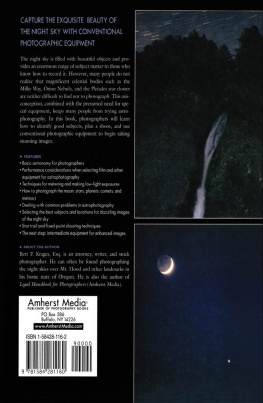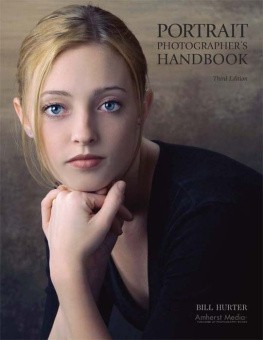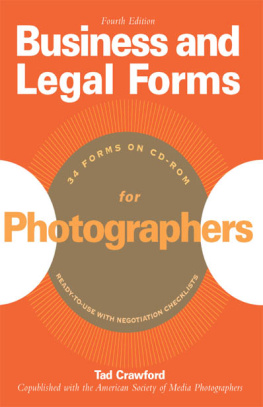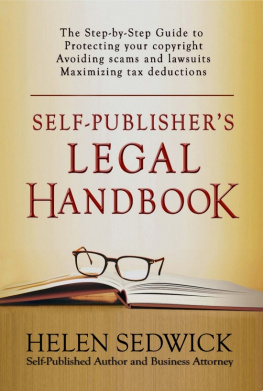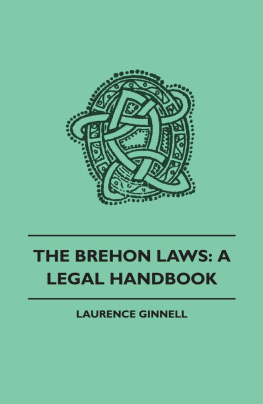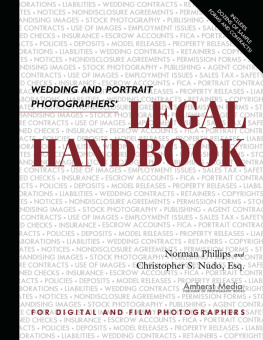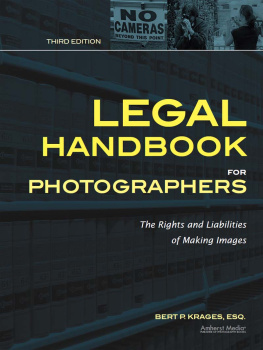Krages Bert P. - Legal Handbook for Photographers
Here you can read online Krages Bert P. - Legal Handbook for Photographers full text of the book (entire story) in english for free. Download pdf and epub, get meaning, cover and reviews about this ebook. year: 2017, publisher: Lightning Source Inc. (Tier 3), genre: Politics. Description of the work, (preface) as well as reviews are available. Best literature library LitArk.com created for fans of good reading and offers a wide selection of genres:
Romance novel
Science fiction
Adventure
Detective
Science
History
Home and family
Prose
Art
Politics
Computer
Non-fiction
Religion
Business
Children
Humor
Choose a favorite category and find really read worthwhile books. Enjoy immersion in the world of imagination, feel the emotions of the characters or learn something new for yourself, make an fascinating discovery.

- Book:Legal Handbook for Photographers
- Author:
- Publisher:Lightning Source Inc. (Tier 3)
- Genre:
- Year:2017
- Rating:5 / 5
- Favourites:Add to favourites
- Your mark:
- 100
- 1
- 2
- 3
- 4
- 5
Legal Handbook for Photographers: summary, description and annotation
We offer to read an annotation, description, summary or preface (depends on what the author of the book "Legal Handbook for Photographers" wrote himself). If you haven't found the necessary information about the book — write in the comments, we will try to find it.
Legal Handbook for Photographers — read online for free the complete book (whole text) full work
Below is the text of the book, divided by pages. System saving the place of the last page read, allows you to conveniently read the book "Legal Handbook for Photographers" online for free, without having to search again every time where you left off. Put a bookmark, and you can go to the page where you finished reading at any time.
Font size:
Interval:
Bookmark:
Table of Contents
About the Author
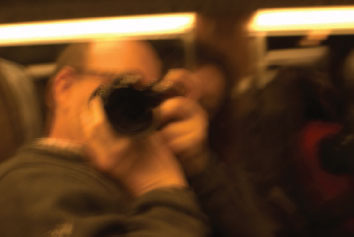
Bert P. Krages II is an attorney in private practice in Portland, Oregon. He is nationally recognized as a public advocate for the rights of photographers to document what they see in public spaces. His website is www.krages.com.
The purpose of this book is to introduce the basic legal principles that govern the making and publishing of photographs as well as some of the practical aspects of dealing with the issues raised by such laws. It should be emphasized at the beginning that, for the most part, society favors the right to take and publish photographs and this is reflected in legal principles that are mostly permissive towards taking photographs and publishing them in print and on the Internet. This does not mean that there are no restrictions. In cases where photography can infringe on important societal interests such as national security or protecting children from sexual exploitation, it can be strictly controlled. Likewise, property owners are generally free to limit activities that take place on their property. This means that if a bank manager does not want you to take photographs while you are in the bank, he is legally entitled to tell you not to take photos. However, he would not be entitled to prohibit you from photographing the exterior of the bank while standing across the street nor could he prohibit you from posting the images on your website.

 Why You Should Know About the Law
Why You Should Know About the Law
Although we live in a society with a seemingly insatiable appetite for images, it cannot be denied that concerns about security and privacy have increased the level of anxiety that people have regarding photography. Photographers have been challenged for photographing the most mundane subject matter, often for the most illogical reasons. Many of the people initiating confrontations have either a gross misunderstanding of the law as it affects photography or act out of a self-centered sense of indignation. Photographers who do not understand the basic rights about what, where, and when they can photograph tend to approach legal issues with blissful ignorance, excessive caution, or reckless abandon. A mother who photographs her two-year-old son playing naked by a lawn sprinkler may assume the innocuous nature of the images will keep her out of trouble. A street photographer may forgo documenting the history of a community because some uninformed persons tells him that anti-terrorism laws prohibit taking photographs of city buses (they do not). More brazen photographers may cross the lines of propriety by trespassing in order to obtain provocative images of matters such as a celebritys private activities (attorneys occasionally refer to these kind of photographers as defendants). Each of these photographers may suffer as a result of their approach to the legal issues associated with photography.
Insight into the law can make you a more effective photographer because it enables you to exercise judgment in a way that allows you to achieve your objectives, even in difficult situations. For example, would you know your rights if a police officer asked you to hand over your memory card after photographing a violent arrest? How would you respond if an a local Little League coach told you that you could not photograph a game being played in a city-owned park because of laws against child molestation? And what are your remedies if your rights to take photographs are violated? Photographers can better handle confrontations when they feel secure about their rights and know about their potential remedies should those rights be violated.
Photographers who know the law are better able to find options that minimize their legal risks. Sometimes the solution is obvious, such as composing shots to exclude an incidental but legally problematic subject. Other times, understanding the practical aspects of the legal system can help solve difficult or awkward situations. For example, many people assume that lawsuits are always about recovering money and are unaware that emotional issues are the root of many kinds of litigation. Interpersonal skills and simple courtesy are not only effective when it comes to avoiding confrontations and lawsuits, they can be skillfully used to make opportunities denied to the less knowledgeable.
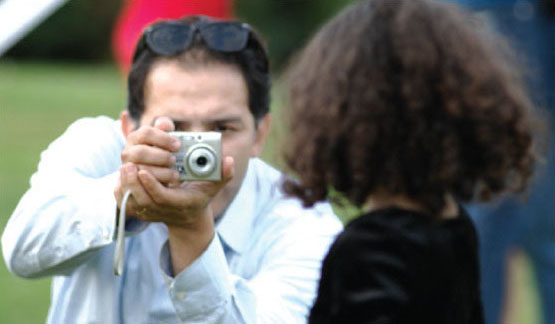
It is lawful to photograph children in public places, although there is a common misconception that parental permission is required.

Technology has made photography more commonplace. Similarly, the Internet and social media have made mass publication of images feasible for the general public.
In addition to the legal issues that affect the taking of photographs, more people need to know about the legal issues associated with publishing their photographs. It was not long ago that publication was not an issue for most photographers because media opportunities were mostly limited to established publishing businesses who relied mostly on professionals for their content. In addition, the publishing industry had customary requirements for photographs that required equipment and film that were significantly different from the kind that most people used. Due to the widespread adoption of digital photography and rise of the Internet as a dominant means of communication, expensive equipment is no longer a barrier to entering into the world of mass dissemination of images. Whereas the norm for commercial images up until the end of the twentieth century for most published photography was transparencies (i.e., slide film) that were shot with a tripod-mounted single-lens reflex camera, today just about anyone can use ordinary cellular telephones to post still images and video on any number of publicly accessible websites.
While understanding legal principles can help you deal with legal issues more effectively, you should also realize that no book can substitute for informed advice from counsel in situations that involve significant legal risk. One reason for this is that the law has not always evolved to the point where it is possible to determine clearly how it applies to particular situations. Furthermore, laws vary among jurisdictions and change over time as legislatures enact new statutes and courts modify legal doctrines to reflect modern sensibilities. These and other factors can make assessing how the law applies to specific facts and locations difficult even for expert practitioners. In cases where the law is unclear or the potential consequences substantial, it is in your best interest to consult with an attorney for advice on the legal risks and how to avoid them.

 How Laws Are Made and Enforced
How Laws Are Made and Enforced
A civil procedure professor once commented that learning about the law is similar to eating sausage. If you like it, then dont watch it being made. In other words, the operation of the legal system is not always consistent with common perceptions of how it should work. Since photographers must apply legal principles to real situations, it is helpful to understand how laws regulate conduct within our society and the mechanisms by which laws are created and enforced.
Next pageFont size:
Interval:
Bookmark:
Similar books «Legal Handbook for Photographers»
Look at similar books to Legal Handbook for Photographers. We have selected literature similar in name and meaning in the hope of providing readers with more options to find new, interesting, not yet read works.
Discussion, reviews of the book Legal Handbook for Photographers and just readers' own opinions. Leave your comments, write what you think about the work, its meaning or the main characters. Specify what exactly you liked and what you didn't like, and why you think so.

